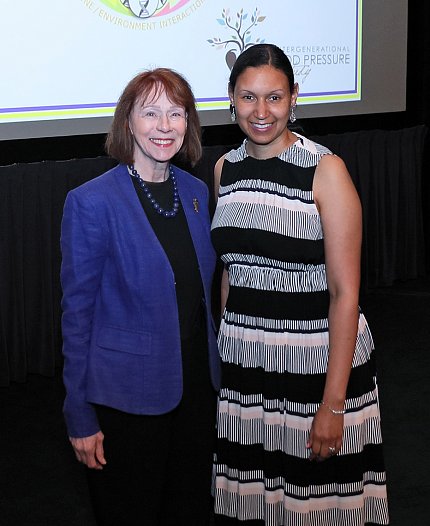NINR Lecture Examines Roots of Hypertension in African Americans

For many college students, the drudgery of a campus job doesn’t lead to much more than funds to cover a few textbooks each semester. For Dr. Jacquelyn Taylor, however, that first campus job was the inspiration for a career in basic science research that would eventually lead to her receiving the highest honor bestowed by the U.S. government to outstanding scientists and engineers in the early stages of their independent research careers: The Presidential Early Career Award for Scientists and Engineers. Taylor is just the fourth nurse to receive this honor.
As Taylor recalls, Dr. Joseph Dunbar, chair of Wayne State University medical school’s department of physiology, “took a chance” and offered her a position as a laboratory technician when she inquired about a campus job. Taylor remained in the lab throughout her undergraduate studies and Dunbar became the first of many mentors helping guide her career studying genetic markers associated with an increased risk for high blood pressure (also known as hypertension) among African-American women.
After graduating with a B.S.N., Taylor later completed M.S.N. and Ph.D. programs, a postdoctoral program in aging and urban health and additional training in genetics and genetic epidemiology. Through it all, she gathered a diverse group of mentors across the fields of physiology, nursing, gerontology, genetics, medicine and social science.
Embodying the spirit of the NINR Director’s lecture series, which according to NINR director Dr. Patricia Grady provides “an opportunity for us to see how the science has grown over time…[and] an opportunity to get a window into the future, where the science is going,” Taylor described the trajectory of her program of research.
Initially, she studied the genetics of hypertension among multiple generations of African-American women in Detroit. Since the women in this study tended to be overweight or obese, she sought to replicate the study among the Dogon tribe in Mali, West Africa, a hunter-gatherer society whose members tend to be underweight, but who still have issues with hypertension. Many African Americans have Dogon roots.
Finally, she replicated the study in a large epidemiological sample, the Hypertension Genetic Epidemiology Network, which includes African-American mothers and daughters with hypertension.
In each of these studies, she discovered single nucleotide polymorphisms—variations in single DNA base pairs—in genes associated with hypertension risk, findings that could help guide clinical practice when considering early interventions and prevention plans.
Taylor, the inaugural Vernice D. Ferguson endowed professor in health equity at the Rory Meyers College of Nursing at New York University, is continuing her research via the NINR-funded Intergenerational Impact of Genetic and Psychological Factors on Blood Pressure study.
Her lecture is available on NINR’s YouTube channel at https://www.youtube.com/NINRnews.
